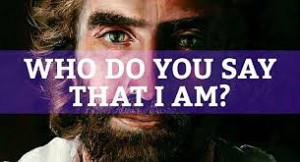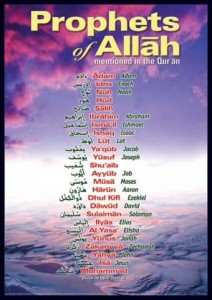I recently attended a Christian-Muslim dialogue event in which a Muslim man presented the Islamic position regarding “Prophethood According to the Qur’an.” One of the points he made was that “prophets must be sinless—as in free from intentional sins, especially major sins like idolatry, murder of innocents, rape, drunkenness, etc.” (this is a direct quote from his handout.) As the Qur’an is quite clear as to Isa (Jesus) being the only sinless prophet, I was a bit surprised at the position he was taking. However, after researching the topic further, it became quite clear that the ‘sinless prophets’ tradition, referred too as Isma in the Islamic literature, is just that, a tradition that was developed outside the teachings of the Qur’an and the hadith. So, you may be asking, why was it developed and what are its origins? Please read on for the answers to these questions. (Much of the following material is excerpts from articles found at: http://answering-islam.org I highly recommend this site for those engaged in Christian-Muslim dialogue.)
This later development of the “sinless prophets” tradition, or what is known as isma, is one that relates to the 25 prophets named in the Qur’an. Throughout the Muslim world today it is generally believed that all of the prophets enjoyed an isma, a protection against sin, and that they were accordingly sinless. This is yet another one of the many inconsistencies and/or contradictions within Islamic theology. As we’ll see from the following Islamic resources, isma has been developed, established and maintained against the plain teaching of the Qur’an and Hadith.
 There are basically two reasons for the rise of this doctrine in Islam. Firstly, the early Muslims soon discovered that the Bible taught plainly that Jesus was the only sinless man that ever lived and, confronted with this evidence, deemed it necessary to invent the fiction that all the prophets, with special emphasis on Muhammad, were sinless as well. A superiority of Jesus over Muhammad could not be tolerated and, just as miracles were attributed to the figurehead of Islam to give him a status at least equal to that of Jesus, so he was also held to be sinless for the same purpose.
There are basically two reasons for the rise of this doctrine in Islam. Firstly, the early Muslims soon discovered that the Bible taught plainly that Jesus was the only sinless man that ever lived and, confronted with this evidence, deemed it necessary to invent the fiction that all the prophets, with special emphasis on Muhammad, were sinless as well. A superiority of Jesus over Muhammad could not be tolerated and, just as miracles were attributed to the figurehead of Islam to give him a status at least equal to that of Jesus, so he was also held to be sinless for the same purpose.
Secondly, the doctrine of revelation in Islam holds that the scriptures were dictated directly to the prophets by the intermediary angel (Gabriel) and it was therefore believed that the prophets must have possessed an impeccable character for, if they could not keep themselves from error in their personal lives, how could they be trusted to communicate God’s revelations without error? This latter presupposition led perforce to the conclusion that the prophets must have been sinless.
Let’s first look at the what the Islamic sources say about Jesus’ sinlessness, a position that was held by Muslims until the time that isma was introduced:
The ahadith record Muhammad as interpreting the preceding passage to mean that Mary and her Son were the only ones whom Satan was unable to touch:
Narrated Said bin Al-Musaiyab:
It is evident from the foregoing that Muhammad not only is said to have believed in Jesus’ sinlessness, but in Mary’s as well. The next hadith supports this view:
Narrated Abu Musa:
Ibn Kathir writes:
And I seek refuge with You for her and for her offspring from Shaytan, the outcast.” The Two Sahihs recorded this Hadith. (Commentary on 3:36; online edition)
Here is the other passage that points to Jesus’ sinlessness:
One thing is for certain–the conclusion that Jesus was sinless stems from a careful examination of both the Quran and the Islamic traditions.
Furthermore, Jesus is the only person specifically said to be blessed:
Christian author and evangelist Samuel Green rightly noted:
Thirdly, both the Quran and the ahadith deny that Muhammad was sinless:
So know (O Muhammad) that there is no God save Allah, and ask forgiveness for thy sin and for believing men and believing women. Allah knoweth (both) your place of turmoil and your place of rest. S. 47:19 Pickthall
Lo! We have given thee (O Muhammad) a signal victory, That Allah may forgive thee of thy sin that which is past and that which is to come, and may perfect His favour unto thee, and may guide thee on a right path, S. 48:1-2 Pickthall
In Mecca, Mohammad receives this command about his sin:
The Arabic word dhanaba (verb form) come from the root dh-n-b. How is dh-n-b defined? Is it only a small weakness? Merely a minor fault?
A Muslim scholar defines it thus: “Crime; Fault; Offence; Sin; Any act having an evil result” (Omar). A western scholar defines it as “a crime, fault, sin” (Penrice). Hence, the above ayahs are unambiguous-Muhammad was not sinless.
The final example of Muhammad’s sin comes from Sura 48, a Medinan chapter.
This verse was probably revealed in 628, barely four years before he died of a fever in AD 632. Does this mean that the messenger of Allah had sin before AD 628? This seems to be the case. To be forgiven of dh-n-b, one must have it first.
And in Sahih Bukhari, Muhammad confirms his sinfulness and need for repenting:
I heard Allah’s Apostle saying.” By Allah! I ask for forgiveness from Allah and turn to Him in repentance more than seventy times a day.” (Sahih Bukhari, Volume 8, Book 75, Number 319)
Fourthly, the following traditions clearly contrast the essential purity of the Lord Jesus from the sinfulness of Muhammad, as well as the other true prophets:
Note that Muhammad allegedly acknowledged that the major prophets (himself included) were sinners in need of forgiveness, with the Lord Jesus being the sole exception! This is perhaps why a Muslim like Qatadah (as reported by Al Tabari) could say:
What is ironic about the preceding hadiths is that instead of having the sinless Jesus intercede for others, the sinful Muhammad is granted the right of intercession, even though the other prophets are unable to intercede PRECISELY because they had sinned! To summarize the data we have gathered thus far, we find that both the Quran and the Islamic traditions mention specifically only three people who were sinless and pure: Jesus, his mother Mary, and John the Baptist.
As we can see, this later development of the doctrine of isma, was adopted without support of the Qur’anic or hadith sources. In his excellent book, The Gentle Answer-to the Muslim Accusation of Biblical Falsification, Gordon Nickel offers the following explanation as to the source of the late Islamic tradition of ‘isma’:
As demonstrated above, the sinlessness of all prophets is not a concept taught by the Qur’an. It should not be surprising, therefore, that the noun ‘isma (“sinlessness, infallibility”) does not appear in the Qur’an, nor does the common participle ma’sum (“immune, infallible, sinless”). Furthermore, the vocabulary of ‘isma does not appear in any of the collections of hadith accepted by Muslims as authoritative, and in fact, these canonical collections contain no trace of the sinlessness of prophets. Even the dogma of the sinlessness of the messenger of Islam is never mentioned explicitly in the canonical hadith.[1]
In regards to the Fikh Akbar ll mentioned in the proceeding paragraphs, under section, THE PROPHETS (UPON THEM BE PEACE), MUHAMMAD AND THE COMPANIONS, it states:
It is obvious that this statement is contradictory. It first states that “the prophets are all free from minor sins,” then concludes with, “nor did he [Muhammad] ever commit a minor sin or enormity,” by which the superiority of Muhammad is affirmed and as such, relegating all other prophets, including Isa/Jesus, as being inferior to Muhammad. Once again, this is a later tradition which has no backing in the Qur’an itself.
To reiterate,  the doctrine was adopted for two reasons:
the doctrine was adopted for two reasons:
Firstly, the early Muslims soon discovered that the Bible taught plainly that Jesus was the only sinless man that ever lived and, confronted with this evidence, deemed it necessary to invent the fiction that all the prophets, with special emphasis on Muhammad, were sinless as well. A superiority of Jesus over Muhammad could not be tolerated and, just as miracles were attributed to the figurehead of Islam to give him a status at least equal to that of Jesus, so he was also held to be sinless for the same purpose.
Secondly, the doctrine of revelation in Islam holds that the scriptures were dictated directly to the prophets by the intermediary angel (Gabriel) and it was therefore believed that the prophets must have possessed an impeccable character for, if they could not keep themselves from error in their personal lives, how could they be trusted to communicate God’s revelations without error? This latter presupposition led perforce to the conclusion that the prophets must have been sinless.
Only one sinless man has ever lived on this earth, that is the God-man, Jesus Christ. Both the Bible and the Qur’an attest to this fact. My dear Muslim brothers and sisters, I ask that you carefully study your own sources regarding Isa ibn Maryam, and after having done so, then study the Bible/New Testament (the Injil) with an open mind so that God may reveal His truth to you so that you may come to know Jesus and who He truly is–the Way, the Truth and the Life. (John 14:6)
For our sake he made him to be sin who knew no sin, so that in him we might become the righteousness of God. (2 Corinthians 5:21)
Since then we have a great high priest who has passed through the heavens, Jesus, the Son of God, let us hold fast our confession. For we do not have a high priest who is unable to sympathize with our weaknesses, but one who in every respect has been tempted as we are, yet without sin. Let us then with confidence draw near to the throne of grace, that we may receive mercy and find grace to help in time of need. (Hebrews 4:14-16)
Resource:
[1] Gordon Nickel, The Gentle Answer-to the Muslim Accusation of Biblical Falsification, Bruton Gate Publishers, 2015, Pgs. 143, 144
Jesus and Muhammad as Prophets of Islam–Nabeel Qureshi
More on the Islamic traditions/positions held regarding the prophets coming soon.









